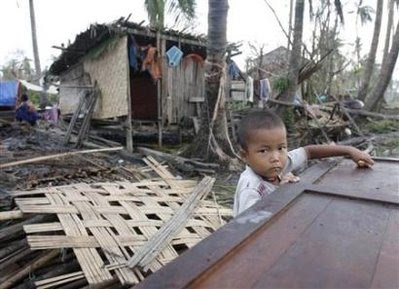

WASHINGTON (CNN) -- The United States is considering air-dropping aid to victims of the cyclone in Myanmar even without permission from the military government, a U.S. official said Thursday.
Ky Luu, director of the U.S. Office of Foreign Disaster Assistance, said dropping food and supplies by air to needy victims could be an option if the government continues to limit access of aid workers.
"Anything that might have a positive impact is being looked at and is being discussed," he told reporters. "Everything within the law is being considered at this point in time."
However, Defense Secretary Robert Gates on Thursday told reporters he "couldn't imagine" the United States dropping aid by air with out permission from the Myanmar government.
On Thursday, nearly a week after Cyclone Nargis barreled into Myanmar, the country's secretive government began allowing more aid agencies into the country to respond to the dire needs of survivors. But aid workers from the United Nations and other organizations were still concerned supplies weren't getting into the country fast enough.
Relief agencies say authorities in Myanmar have been slow to issue visas to a small army of relief workers gathered in Thailand who are poised to fight a tide of hunger and disease.
"We have gotten valuable cooperation. The first steps have been taken," Bettina Luescher, from the World Food Programme, told CNN Thursday. "But it's taking too slow. It needs to go much quicker."
The United States has also been pushing for access, pledging $3.25 million and offering to send U.S. Navy ships to the region to help relief efforts. The U.S. military flew six helicopters to a Thai airbase in anticipation of gaining access to the south Asian country to provide aid, two senior military officials told CNN's Barbara Starr.
When pressed on whether food drops would be legal, Luu said a recent U.N. mandate calling for a "responsibility to protect" could pave the way for such action, but he wasn't entirely sure of the legal ramifications.
"Let's say we were only given permission to be able to drop off food, then ... that is something that we would do," he said.
But Luu, cautioned, air drops are not the most efficient way to get aid to those in need because there is no infrastructure on the ground to deliver it to the affected areas.
"You can bring in commodities but if they are not reaching the impacted areas, if they are not available in terms of warehouse space and logistics -- forklift capacity and trucks and helicopters to go and bring it out -- we may be inundated and create a logjam," he said
It would be best, he said, to have aid workers in the country.
Luu said victims of the cyclone are in desperate need of clean water and temporary shelter. He stressed the importance of getting the U.S. Disaster Assistance Response Team into the country to determine how to best help aid efforts.
So far the Myanmar government have refused to provide visas for U.S. aid workers and for the DART team.
"The DART's presence helps us make informed decisions and helps us be able to get the resource out quicker," Luu said. "Without the DART on the ground or without other operational partners, it's very difficult at this point in time to tell you exactly what the conditions are on the ground; how many people are impacted; what are the needs."





















No comments:
Post a Comment